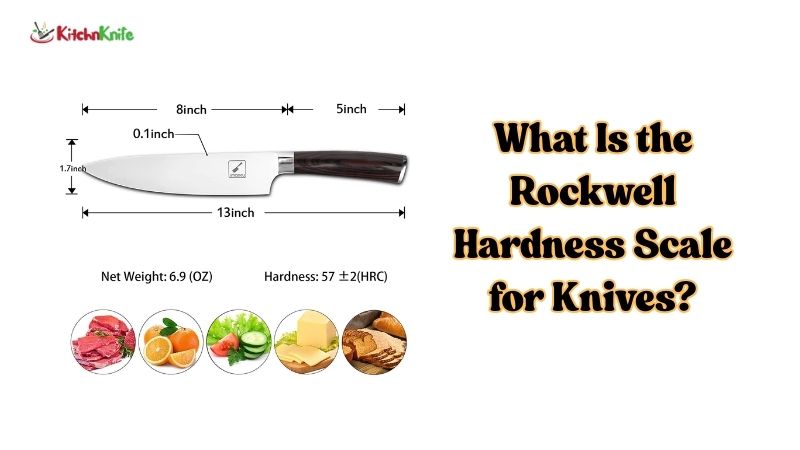Last Updated on May 25, 2025 by Susanna Zuyeva
The Rockwell Hardness Scale for Knives: HRC Explained
Ever wonder why some knives stay sharp longer? Or why others chip so easily? The answer lies in hardness. And we measure that with the Rockwell scale.
What is the Rockwell Hardness Scale?
The Rockwell scale tests how hard steel is. It uses a diamond point or steel ball. The tool presses into the metal. The deeper it goes, the softer the steel.
For knives, we use the C scale. That’s why you see “HRC” – Hardness Rockwell C.
Think of it like this: soft butter vs. hard candy. The diamond point sinks deep into butter. It barely dents hard candy.
The scale goes from 1 to 70. Most knives sit between 52 and 65 HRC.
Typical HRC Ranges for Chef’s Knives
Here’s what you’ll find in most kitchens:
Soft knives (52-56 HRC):
- Most cheap knives
- Some older German brands
- Easy to sharpen
- Dull quickly
Medium knives (57-60 HRC):
- Most German knives
- Many American brands
- Good balance
- Hold an edge well
Hard knives (61-65 HRC):
- Japanese knives
- High-end German knives
- Stay sharp longer
- Harder to sharpen
What’s Too Soft or Too Brittle?
Too soft (below 52 HRC): Your knife will feel like cutting with a butter knife. It won’t hold an edge. You’ll sharpen it every few uses.
Too hard (above 65 HRC): Your knife becomes fragile. It might chip if you drop it. Or crack if you hit a bone.
The sweet spot? Most experts say 58-62 HRC. This gives you sharp edges that last. Plus, they won’t break easily.
HRC Ratings by Knife Type
Western Knives:
- German: 56-58 HRC (Wüsthof, Zwilling)
- French: 55-57 HRC (Sabatier)
- American: 58-60 HRC (Made In, Cangshan)
Japanese Knives:
- Gyuto: 60-62 HRC
- Santoku: 59-61 HRC
- Nakiri: 61-63 HRC
- Single bevel: 63-65 HRC
Budget Knives:
- Most store brands: 52-55 HRC
- Stamped knives: 54-56 HRC
Specialty Knives:
- Fillet knives: 56-58 HRC (need flex)
- Cleavers: 58-60 HRC (need toughness)
- Paring knives: 57-59 HRC
Impact on Sharpening Frequency
Hardness affects how often you sharpen:
Soft knives (52-56 HRC):
- Sharpen every 2-3 uses
- Easy with any stone
- Quick to restore
Medium knives (57-60 HRC):
- Sharpen every 1-2 weeks
- Work with most stones
- Take more time
Hard knives (61-65 HRC):
- Sharpen every month or more
- Need fine stones
- Take patience and skill
Pro tip: Honing helps all knives. Use a steel rod between sharpenings. It keeps the edge aligned.
Which HRC is Best for You?
Choose soft (56-58 HRC) if:
- You’re new to knives
- You don’t mind sharpening often
- You want easy maintenance
- You cook daily and need reliability
Choose medium (58-61 HRC) if:
- You want the best balance
- You cook several times a week
- You can sharpen monthly
- You want good performance
Choose hard (61-64 HRC) if:
- You love ultra-sharp edges
- You have sharpening skills
- You baby your knives
- You want the best cutting feel
Real-World Examples
Let’s look at popular brands:
Wüsthof Classic (58 HRC): Great for beginners. Stays sharp for weeks. Easy to maintain. Tough enough for daily use.
Shun Classic (61 HRC): Super sharp out of the box. Holds an edge for months. Needs careful handling. Amazing for precise work.
Zwilling Pro (57 HRC): Solid workhorse. Good sharpness retention. Forgiving if you’re rough. Perfect for busy kitchens.
Global (58-59 HRC): Light and sharp. Easy to control. Decent edge holding. Good stepping stone to Japanese knives.
Miyabi (60-63 HRC): Razor sharp. Beautiful finish. Long-lasting edge. Needs respect and care.
The Bottom Line
HRC numbers matter, but they’re not everything. A 58 HRC knife from a good maker beats a 62 HRC knife from a bad one.
Look for these signs of quality:
- Even hardness across the blade
- Proper heat treatment
- Good geometry
- Sharp out of the box
Most home cooks do best with 58-60 HRC. You get sharp knives that aren’t too fussy. They cut well and forgive mistakes.
Remember: the best knife is the one you’ll use and maintain. A sharp 56 HRC knife beats a dull 62 HRC knife every time.
Start with medium hardness. Learn to sharpen. Then decide if you want softer (easier) or harder (sharper) for your next knife.
Your cooking style, skill level, and patience all matter more than the exact HRC number. Choose what fits your life, not what looks best on paper.

